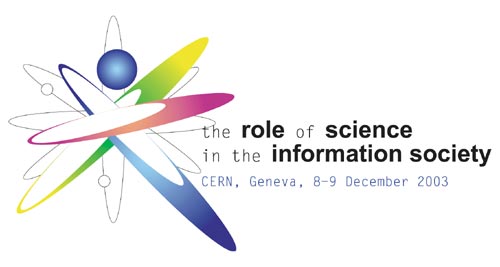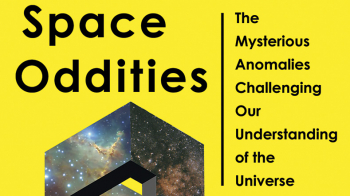In hosting the recent RSIS conference, CERN took a bold step into the global policy arena. Manjit Dosanjh, John Ellis and Hans Hoffmann explain why.

On 8 and 9 December 2003, CERN hosted a conference on The Role of Science in the Information Society (RSIS), immediately prior to the World Summit on the Information Society (WSIS). Our efforts to organize this conference were stimulated by a challenge that the UN secretary-general Kofi Annan made to the world scientific community. Last March in the magazine Science, he wrote that “recent advances in information technology, genetics and biotechnology hold extraordinary prospects for individual well-being and humankind as a whole,” but noted that “the way in which scientific endeavours are pursued around the world is marked by clear inequalities.” Annan called on the world’s scientists to work with the UN to extend the benefits of modern science to developing countries.
The open exchange of information, made possible by the World Wide Web and other information technologies, has revolutionized everything from global commerce to how we communicate with friends and family. We live in the age of the “information society”, but without science there would be no such thing; it was basic science that made the underlying technologies possible. Moreover, continuing scientific research is necessary to underpin the future development of the information society – through the sharing of distributed computing resources via the Grid, for example.
The information society has the potential to empower scientists from regions of the world that have not been prominent in recent scientific research, but have valuable human resources and original perspectives on many of the problems we all face. This could create, in the words of Adolf Ogi, special advisor to the Swiss Federal Council on WSIS, “science sans frontières”, making use of what Adama Samassékou, president of WSIS PrepCom, described as “indigenous knowledge”.
Prior to the conference CERN conducted an online forum where scientists, policy makers and stakeholders from around the world reviewed the prospects that developments in science and technology offer for the future of the information society, especially in education, health, environment, economic development and enabling technologies. These issues formed the basis for discussions in five parallel sessions at RSIS, which complemented the plenary sessions. The result is a vision for how information and communication technologies can be applied for the greater benefit of all.
Education is a key element for development. Information and communication technologies (ICTs) are vital for learning at all stages of life. Here, south-south co-operation is as important as north-south co-operation. In the area of health, ICTs can help in priority public-health areas by promoting the dissemination of health information, enhancing capacity-building and permitting telemedicine. In the case of environmental issues, planners and decision-makers need accurate, local and timely information – global collaboration is vital to ensure access to appropriate environmental data. To accelerate economic development, education and the dissemination of scientific knowledge and technological know-how through ICTs is a critical component of local and national development. It is important for scientists in all countries to unite to define their local needs in terms of ICT infrastructure and content.
Through these examples in particular, RSIS was able to formulate a vision of how ICTs can be applied to benefit all. The following themes emerged as guidelines and received clear support at RSIS: that fundamental scientific information be made freely available; that the software tools for disseminating this information be also made freely available; that networking infrastructure for distributing this information be established worldwide; that the training of people and equipment to use this information be provided in the host nations; that general education underpins all these goals and is an indispensable basis for the information society.
Several of the objectives defined at RSIS are already making headway. In particular, the WSIS draft Declaration of Principles recognizes that “science has a central role in the development of the information society.” Moreover, the WSIS draft Action Plan aims to promote high-speed Internet connections for all universities and research institutions; the dissemination of knowledge through electronic publishing and peer-to-peer technology; and the efficient collection and preservation of essential scientific data.
In hosting the RSIS conference, CERN took a bold step forward into the policy arena. Since scientific research underpins the past and future development of ICTs and thereby the information society, we scientists have a particular moral responsibility to prevent the “digital divide” from further increasing the gap between rich and poor. Moreover, the information society offers scientists from all parts of the world the opportunity to contribute to the global scientific adventure of which CERN’s Large Hadron Collider is just one example.
It is vital that the global scientific community engages fully in the policy arena, through the development of new and affordable technologies to overcome the digital divide. The scientific community should commit its best efforts to implementing the WSIS Action Plan and to demonstrating real progress by the time of the next WSIS meeting in Tunis in 2005.







